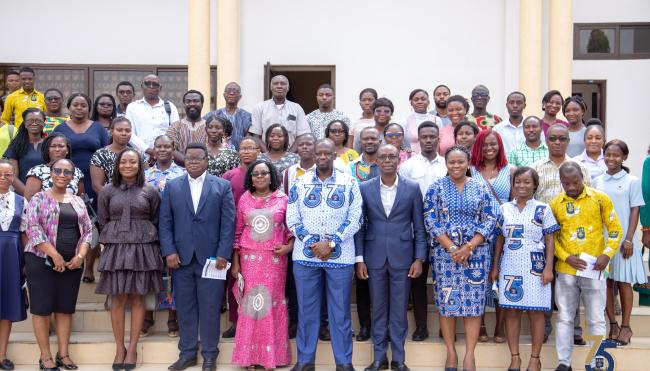As part of its ongoing research efforts to champion sustainable and clean energy solutions in Ghana, the Institute of Social Statistical and Economic Research (ISSER) recently hosted a research dissemination workshop focusing on the outcomes of the Modern Energy Cooking Services (MECS) Phase II project.
The dissemination workshop held at the ISSER Conference room served as a focal point for stakeholders from the energy sector, academia and various media outlets, as well as for the researchers working on the project to shed light on the superior advantages of electric cooking (e-cooking) technologies.
Supported by the World Bank, the MECS project was designed to investigate and make recommendations to transition households to modern cooking fuels, away from traditional solid fuels. Following the successful implementation of Phase I between 2020 and 2021, researchers extended the project to gather further evidence, conducting MECS Phase II from 2022 to 2023. The aim was to demonstrate empirically the benefits associated with modern energy cooking services, especially e-cooking, with a notable impact beyond academic circles.
During the workshop, which spotlighted the Electric Pressure Cooker (EPC) as the focus of the MECS project, researchers highlighted e-cooking as a cost-effective, safe and healthy alternative to traditional cooking fuel choices.
Providing an overview of the project, Prof. Simon Bawakyillenuo, Principal Investigator, emphasised the critical role of local-level actions in achieving global objectives. He remarked, “Without us acting locally on the clean cooking front, we will not be able to achieve the Sustainable Development Goals (SDGs) by 2030.”

Prof. Bawakyillenuo further stressed that clean cooking is not merely about preparing meals but also about building resilience and supporting livelihoods. He encouraged households to adopt the EPCs in a bid to curb the overreliance on LPG and charcoal which are contributing to climate challenges.
Mr. Innocent Agbelie from the ISSER MECS research team presented the project’s findings, the first part of which was focused on demonstrating the capabilities of eCook technologies in cooking Ghanaian local foods.
He noted that in carrying out the project, a quasi-controlled cooking test involving four cooks, four meals and four fuel technologies was conducted, revealing that eCook technologies incurred the least cost in terms of fuel consumption.
Mr. Agbelie shared that LPG was found to be the most expensive on average. “Additionally, while LPG and charcoal emitted CO and PM2.5, eCook technologies recorded zero emissions. Despite longer cooking times, especially in frying components, the experiments showcased the overall efficiency and environmental benefits of eCook technologies” he added.
Touching on the behavioral change study conducted as part of the project aimed to compare the general perceptions of households in urban and peri-urban areas about eCooking with the actual facts. Mr. Innocent Agbelie highlighted the mixed-method design, including a household survey and three focus group discussions in Adenta, Ga East and Ga West.
The intervention programme, based on the outputs of the cooking experiments, according to him was delivered in educational video formats to randomly assigned ‘Treatment’ and ‘Control’ communities.

Mr. Agbelie also mentioned that the study involved 22 urban and 8 peri-urban communities, with findings indicating that presently, LPG remains the first choice for households, followed by charcoal and then electricity. Mr. Agbelie said, “Despite nearly 80% of households perceiving eCooking as expensive, over 60% expressed willingness to use the Electric Pressure Cooker (EPC).”
He indicated that the use of the EPC was particularly high among the younger generation, however, affordability emerged as a significant constraint, especially concerning electricity tariffs and safety concerns, posing setbacks for the adoption of eCooking.
Key recommendations from the research team included practical education and awareness campaigns to demystify the belief that e-cooking is too expensive, promoting e-cooking technology access programmes and preventing substandard products from entering the market.
Earlier, Prof. Charlotte Wrigley-Asante, Head of the Department of Geography and Resource Development at the University of Ghana, applauded the project for addressing the health-related and productivity costs associated with using polluting fuels. She commended the initiative for aligning with Sustainable Development Goal 7, which focuses on affordable, reliable and clean energy for all.

Mr. Alex Donyinah, an energy consultant and representative from the World Bank, expressed the World Bank’s interest in collaborating with the Government of Ghana and organisations like ISSER to achieve the country’s goal of universal access to modern energy solutions by 2030.

Prof. Peter Quartey, the Director of ISSER, in his welcome address, highlighted the transformative potential of the topic and stressed the importance of inclusive dissemination, advocating for communication in local languages to reach a broader audience.
The workshop was moderated by Mamavi Owusu-Aboagye, a journalist at the Multimedia Group Limited and featured engaging activities such as a documentary on cooking diaries and interactive polls, facilitating deep participant engagement. The Q&A session provided an opportunity for interactive discussions with the research team.


